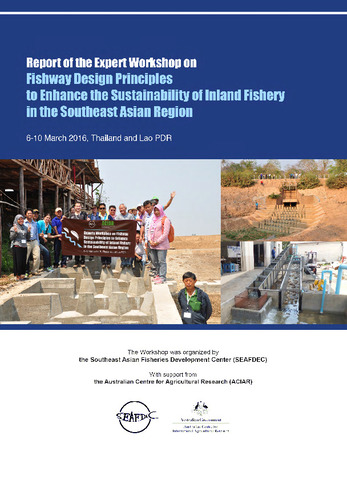Report of the Expert Workshop on Fishway Design Principles to Enhance the Sustainability of Inland Fishery in the Southeast Asian Region
Share
Abstract
The Expert Workshop on “Fishway Design Principles to Enhance Sustainability of Inland Fishery in the Southeast Asian Region” was organized by the Southeast Asian Fisheries Development Center (SEAFDEC) on 6-10 March 2016 in Thailand and Lao PDR under the project on “Application of fish passage design principles to enhance sustainability of inland fishery resources in the Southeast Asian region” with financial support from the Australian Centre for International Agricultural Research (ACIAR). The Expert Workshop was participated in by the participants, which include international and regional experts, officers and experts of Department of Fisheries and the Royal Irrigation Department of Thailand, as well as SEAFDEC Secretary-General, concerned officers of the SEAFDEC Secretariat, Training Department (TD), and Inland Fishery Resources Development and Management Department (IFRDMD). During the Expert Workshop, participants noted the biological information and requirements of different species group is very important for development of appropriate design of fishway. Although, the existing fishway design could facilitate migration of fish, but not all species could migrate up to lake. There is therefore a need for identification of target species, which should focus on those that require long-distance migration. From the Experts’ presentation on the works related to fishways design development in Cambodia, Lao PDR, and Thailand, it was noted that there are several types of fishways could be used to facilitate either upstream or downstream migration of fish, the choosing of particular design need to compare their advantages and disadvantages, and take consideration the concerned species. It was
emphasized that one of the factors to facilitate effective migration of fish at fishway is the operational management of water inflow to fishway facilities in particular fish passing to culvert. The experiment fishway model which was developed by SEAFDEC/TD under the ACIAR-supported project on “Application of fish passage design principles to enhance sustainability of inland fishery resources in the Southeast Asian region,” was presented and discussion particularly on criteria for fishway
design towards enhancing the sustainability of inland fishery resources in the Southeast Asian region. Moreover, the future actions were also discussed. It was recommended that the fishway experiment at TD should be continued, funding support also should be further sought for conduct of field experiment and validation, and assessment be made on new design of fishway in comparison with existing design(s). In this connection, the Workshop also suggested to conduct experiments using fishway model developed by TD to come up with biological information on various fish species/species group.

